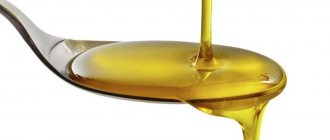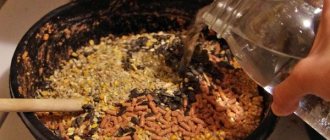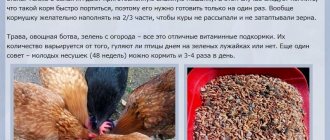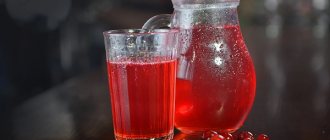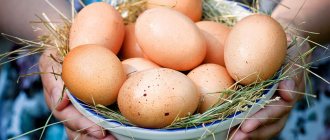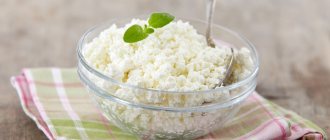» Poultry farming » Chickens » Rules for taking vitamins for chickens
0
1365
Article rating
With the onset of cold weather, hazel grouse begin to lay eggs poorly. They receive some useful microelements directly from food, and the missing substances must be added artificially to increase egg production. Vitamins for chickens should be included in the daily diet of birds.
- Summer feeding
- Ready-made vitamin complexes
- Vitamins to increase egg production
- Products prohibited for chicken consumption
- Conclusion
Rules for taking vitamins for chickens
Benefits of microelements
For good egg production in summer, it is recommended to add as many natural vegetables (carrots, cabbage, potatoes, beets) and herbs (dandelion, nettle, clover, plantain) to the food of poultry.
Winter feeding of chickens includes the addition of multivitamin supplements.
A poorly thought-out diet often results in a small egg, the yolk will not be bright, and the taste of chicken meat will suffer greatly, so it is important to know what multivitamins should be given to chickens and when.
Natural vitamins for broiler chickens
Not all farms have artificial vitamin supplements. Natural vitamins contained in food help to diversify the diet of birds.
High concentrations of such compounds are found in:
- fresh herbs (green onions) - A;
- needles - C;
- cottage cheese - C, PP;
- carrots - A;
- feed yeast - B;
- fresh beets - S.
Clean water in birds' water bowls is another condition for their healthy development. It is recommended to change it every day.
Useful material
Proper feeding of chickens with various vitamins is to diversify the daily diet of birds with dietary supplements. Riboflavin improves metabolism in birds, which also has a beneficial effect on the size of eggs laid.
This substance is mixed into the water immediately after the chicks hatch. You can buy Riboflavin in the pharmacy chain. Fish oil is often used for rapid growth of birds.
A lack of nutrients (D and E) causes such a dangerous disease as rickets and leads to the fact that the bird hatches a sterile egg, from which it is impossible to hatch chickens. To make up for the loss of these substances at home, the chicken family is given yeast, legumes and grains.
Dairy products and bran are an irreplaceable source of group B substances, without which the normal development of internal organs in representatives of the feathered family is impossible. The lack of this microelement is evidenced by the deterioration of the condition of chicken feathers.
To make up for the deficiency, you can independently prepare a nutrient mixture consisting of nettle and lime mixed with an aqueous solution on sand. The ingredients are mixed until smooth and added to food at least 3-4 times a week. Liquid yeast will help solve this problem (1 tsp for every 1.5 kg of body weight). This supplement is ideal for enriching the chicken body with useful microelements in the summer.
Vitamins should be given to chickens according to the instructions or after consultation with a veterinarian, who, after examining the pets, will prescribe the exact dosage.
It is easy to buy vitamins for laying hens to increase egg production - ready-made preparations are freely available in any pharmacy chain.
Why do chickens need vitamins?
Vitamins are just as important for chickens as they are for people. They are an important part of the metabolic processes of the bird's body. Without a sufficient amount of vitamins, chickens will not be able to fully develop, grow, and even more so enjoy productivity.
If there is a lack of vitamins, the growth of the bird slows down, and various diseases begin to develop. If there is a deficiency of vitamins over a fairly long period, it can even lead to death! It is possible to determine that chickens lack vitamins by certain signs.
- Poor immunity, frequent illnesses indicate a lack of
Feather loss – lack of vitamin B2, E
atka vitamins B or E.
- Increased fearfulness, nervousness, and anxiety indicate malfunctions of the nervous system and a lack of vitamin E.
- A decrease or cessation of egg production indicates a deficiency of vitamins A, D or B2.
- Feather loss and generally poor feather quality compared to other representatives of the breed is a lack of vitamin B2, E.
- Heart problems, heart attacks or any other similar diseases - deficiency of vitamin B1, B2.
- Bleeding from the cloaca, hematomas may indicate a lack of vitamins B1, B12, K.
- Slow or absent growth of young animals indicates a lack of vitamin A and D.
- Thin shells may indicate a calcium or vitamin D deficiency.
- If the yolk of eggs is light or even white, then the problem is vitamin A deficiency.
Important!
Not only a deficiency, but also an excess of vitamins is dangerous for chickens, so any vitamin complexes are given only according to the instructions!
Often the problems listed above may indicate some kind of disease or lack of minerals, but first of all, the possibility of vitamin deficiency is excluded.
Cereals and legumes
The main part of the feed of any domestic chicken is grain. Many useful microelements are found in corn and wheat. Natural cereals successfully combine proteins, fats and carbohydrates.
Legumes are an excellent source of protein and amino acids that poultry need.
These products are added to the feed in ground form along with fresh vegetables. Making flour from cereals enriches the body of poultry with fiber. You can make it yourself from corn, barley and wheat. Ruffed grouse do not like oats and eat them reluctantly. According to farmers' reviews, flour made from spruce branches has proven itself to be excellent in increasing egg production.
Vital vitamins for improving health are contained in legumes - beans, soybeans, peas. Before adding these products to chicken feed, they are pre-soaked for 5-8 hours in water, lightly boiled and only then given.
Preparing vitamins in advance
As for yeast and fish oil, these components are not in short supply; they can be purchased at any time of the year in a regular store or pharmacy. However, we must remember that poultry also needs other components of food: protein and complex carbohydrates.
You can check whether the bird is getting enough vitamins by looking at the quality of the shell. If it's firm, everything is fine. Otherwise, you need to reconsider the diet: perhaps the bird is not given enough calcium.
Green fodder is dried at the end of the summer. Moreover, all greens, including inflorescences, must be thoroughly dried in the sun and only then ground to the state of birdseed or ground flour. Until new greens grow, grass meal will be a complete source of nutrients. In addition, it is worth noting the importance of ground pine needles in the diet of chickens. It is also first dried and then ground into flour.
Vegetables are also dried in the spring, after which, chopped, they become an integral part of the diet. Particular attention should be paid to the following:
- carrot;
- cabbage leaves;
- Buryak
Despite the simplicity and general availability of these components, they are ideal for the chicken diet and replenish the deficiency of vitamins and microelements.
Protein foods and root vegetables
It is important that vitamins for laying hens contain protein - a substance responsible for the full growth of the bird. They enter the body along with dried grass, offal and fish added to food.
Including root vegetables in the chicken diet will help increase egg production. Vegetables should be prepared in advance for the winter season, so that with the onset of cold weather, pets can freely receive fresh food. Favorite root vegetables for laying hens are beets and potatoes. By adding these vegetables to your feed daily, you enrich it with useful substances that promote normal egg formation.
What vitamins do chickens need?
Also check out these articles
- Friesian horse
- How to properly prepare raspberries for winter
- Germination of grape cuttings
- Autoclave Malinovka 2 in 1
Those birds that often walk in the yard are much less likely to suffer from vitamin deficiency
For egg production, development and gain of muscle mass, as well as normal growth and well-being, chickens need to receive vitamins along with feed. Those birds that often walk in the yard eat not only grain or mixed feed, but also grass, bugs, worms, root vegetables and vegetables, fruits, and are much less likely to suffer from vitamin deficiency. If individuals are kept in a cage, they require an increased amount of vitamins.
What vitamins are needed for chickens? In fact, absolutely all vitamins are important for chickens. But some of them are simply extremely necessary, and even with the slightest deficiency, malfunctions in the body’s functioning can begin. These include vitamin A. E, C, D and B vitamins.
Important!
Chalk, lime, fine gravel, wood ash and shells are incredibly important for the normal digestion of chickens, so they should be present in their diet throughout the year!
Multivitamins for domestic chickens
In winter, when birds do not have the opportunity to peck fresh grass and lack nutrients, farmers begin to give them supplements in the form of a balanced mineral complex as often as possible.
Vitamins for egg production necessarily include phosphorus, calcium and potassium. You can buy a ready-made multivitamin complex and add it to the feed of laying hens, or prepare a fortified mixture yourself. To do this, take chalk, shells, chicken egg shells and lime in equal proportions, which are thoroughly ground and mixed. This mixture can then be given to your pets.
Egg shells contain a lot of calcium, so regular consumption improves the appearance of birds and strengthens their claws and beak.
Lime must be quenched with water relatively recently, otherwise it will not contain useful trace elements. You can use iodized salt. By adding literally 1 teaspoon of it to the water every day, you will quickly increase egg production in your pets.
Natural products - chalk, lime, shell rock, ash, eggshells - can become an inexhaustible source of vitamins. These minerals help make the egg large in size, affect the color of the yolk and the taste of the chicken fillet.
The meat of poultry whose diet is enriched with such microelements will not be stringy. At the same time, she will quickly gain weight.
Nutritional supplements
It was previously said that ordinary earthworms are a significant source of essential nutrients for laying hens, so we must do our best to ensure that the chicken eats as many of them as possible. However, you can’t get by with worms alone, because you need to take care of vitamins all year round, that is, all 12 months, including winter.
How can you help a chicken in winter, how can you enrich its diet? In addition to the fact that you can purchase ready-made dry fortified food, you should pay attention to the following components:
- sprouted wheat grains;
- live yeast (boiled in water or beer, then cooled and given to the bird);
- fish oil capsules or pure fat;
- dried grass, prepared in advance for the season.
Additional food in winter
Laying hens have the hardest time in the cold season; they develop vitamin deficiency.
Its symptoms are visible to the naked eye - deterioration in the well-being of individuals, the appearance of feathers, drowsiness and lack of appetite, so it is very important to give vitamins to laying hens in winter.
You need to properly think through the birds’ diet so that they feel good and lay high-quality eggs.
Feeding mode:
- potatoes and bran should be added to the morning feed consisting of wheat;
- daytime food is the best time to add useful microelements (chalk, shells, limestone, nutritious flour) to the bird’s diet;
- in the evening feed whole grains;
- To increase egg production in the cold season, it is important not to forget about feeding fresh vegetables.
Make sure your vitamins contain proteins, fats and minerals this time of year. The size of the egg and the color of the yolk directly depend on these substances.
Recommendations
To ensure that with the onset of cold weather the birds do not lack nutrients, certain preparations should be made in the summer.
You can collect greens at home. First, the grass is torn, then it is thoroughly dried in the sun, after which it is finely chopped. Daily addition of these ingredients to feed will improve poultry production significantly.
It is not difficult to understand whether laying hens still need vitamins in winter. A lack of microelements will immediately affect the quality of a chicken egg - its shell becomes fragile and uneven.
What to add in winter?
As soon as winter comes, poultry farmers add mineral and fortified supplements to the bird diet so that egg production does not decrease. In summer, the bird takes these elements on its own during walks. In winter you cannot do without the help of a farmer.
What affects productivity? Main factors:
- Length of daylight. In winter, additional light sources are added.
- Temperature in the poultry house. When it's cold, chickens don't lay eggs. Heaters are used.
- Diet. The winter diet is significantly different from the summer one. With the arrival of winter, chickens suffer from vitamin deficiency. The daily menu is enriched with high-calorie foods, vitamins, and supplements. However, it is worth monitoring the weight of laying hens; obesity is a pathology.
Summer feeding
You need to start feeding your pets 1-1.5 months before they start laying eggs.
All this grass is good for the bird. It has useful vitamins, fiber and does not cause obesity.
In winter, chickens lack the vitamin, unlike in the summer, so adjust their diet so that it necessarily includes the following products: barley, oats and fresh grass. The last ingredient contains fiber that is vital for birds.
Every day birds should be given 40-45 g of this substance. Fiber is found in grass, so during the warmer months, focus on fresh food. During this period, they try to feed them as often as possible - 3-4 times a day, but it is important to ensure that they are not overfed.
Minerals in chicken feeding
Now let's talk about minerals.
Ca. The thin shells of eggs will indicate a lack of mineral. Calcium is the main “building material” of skeletal tissue and teeth, a mineral responsible for many processes occurring inside cells. With its participation, hormones and neurotransmitters are produced.
Mg is a biogenic element under the influence of which enzymatic reactions occur. With its participation, ATP is formed - a nucleotide that supplies energy to cells. Sufficient intake of magnesium reduces the risk of pathologies of the nervous system, digestive system and cardiovascular system.
Important! The more animal fats in the diet, the worse magnesium is absorbed.
Signs of a mineral deficiency in the body: low egg production, weak bones, refusal to feed.
P. Phosphorus deficiency leads to disruption of the shell formation process and deterioration of calcium absorption.
I. With a lack of such a mineral, the goiter increases, the larynx is compressed, making it difficult for the bird to breathe. At the same time, the poultry farmer receives 1.5 times fewer eggs from laying hens per season.
Fe. Feeding birds with feed that is low in iron leads to anemia and cessation of egg laying.
Mn is a substance without which various parts of the skeleton are deformed, the shell becomes thinner, and egg production sharply decreases.
Zn is an element, the deficiency of which worsens the condition of bones and plumage. Add to this the thinning of egg shells.
How to replenish vitamins and minerals in feeding chickens?
Any premix based on a vitamin complex is indispensable in winter, when there is no green food in the feed supply.
Ready-made vitamin complexes
A lack of nutrients often leads to irreversible consequences.
As an option, use ready-made complexes that are easy to find in any specialized store. There is a wide range on the market. The names of the most popular: Undevit, Trivit and Chiktonik.
They are given mainly in winter. The instructions for the drugs contain detailed information about what dosage should be followed.
These drugs will easily eliminate vitamin deficiency, which manifests itself especially strongly in the spring after a long winter, strengthen the body's defenses, and help cope with viruses.
You can use other vitamins to increase the egg production of chickens. Medicines that are added to drinks or diluted with water have proven themselves to be effective. 5-15 drops are enough.
Vitvod is a universal complex, a concentrate of various vitamins that are taken in the form of drops. It is suitable for use at home in winter.
Spring is the period when hazel grouse are actively gaining strength after winter. During this period, it is necessary to maintain the strength of chickens by adding vitamin complexes to their food.
For older birds, Vittri vitamins are suitable - this is a preparation containing microelements of groups A, E, B and D. It can be given diluted or used as an injection solution. Treatment with this drug allows you to overcome many types of infectious diseases.
Vitamins and minerals important for poultry farming
Vitamins for broiler chickens play a vital role
in the diet. Many vitamins for chickens are commercially available that can stimulate the process of their egg production. They contain everything laying hens need in winter. Such supplements contain little vitamin C, which birds do not need.
In the winter season, bird food should be enriched with the following vitamins:
- A;
- AT 12;
- E;
- D3;
- AT 2;
- TO;
- AT 6.
In addition, each bird needs:
- folic acid;
- niacin;
- calcium;
- choline
A lack of the described compounds in food leads to the development of vitamin deficiencies, which negatively affect the health of laying hens.
Vitamins to increase egg production
Vitamins for laying hens for egg production, included in the top 5 most popular, which every breeder should know about:
- Zeolite is a dietary supplement containing useful microelements. The complex increases the intensity of egg laying.
- Premix is a drug that affects not only the quality of the egg. Thanks to it, chicken meat changes its composition and becomes even more dietary.
- Ruffed grouse is a dietary supplement that can restore the lack of useful microelements in a bird’s body.
- Felucen - these vitamins will allow chickens to replenish the missing substances, and the birds will no longer experience vitamin deficiency.
- Zdravur Laying hen - the content of this additive helps birds improve their metabolism. Enzymes and amino acids have a beneficial effect on the development of chicks.
The use of dietary supplements guarantees increased egg production in poultry and improved meat quality
These dietary supplements can be mixed with each other. After the egg production of hazel grouse has increased, you can stop taking it daily by including the drugs in the chickens’ diet 2-3 times a week. Vitamins for laying hens can be bought without a prescription at the market or in a specialty store.
Products prohibited for chicken consumption
Knowing what vitamins are necessary for laying hens is important for every farmer who is planning to breed them. However, we should not forget about foods that are contraindicated for adding to the food of hazel grouse. These are fish products. You cannot feed birds more than once every 10 days with fish fillets and bones. Such food provokes a strong feeling of thirst, which can significantly weaken the body of pets.
When choosing beets for food, remember that it is recommended to give birds a vegetable with a light center, since ordinary table beets cause them problems with the gastrointestinal tract. It is forbidden to give chickens human products: cheese, salt, milk, chocolate.
Vitamins for chickens
Vitamins for chickens...
Natural vitamins for laying hens.
Foods that should not be given to birds
Each chick, like an adult bird, has a certain principle of the structure of the digestive system, which differs from that of humans. Therefore, not all food from the kitchen table can be given to chickens.
Be sure to read:
Which is better to buy a premix for laying hens and broiler chickens or make it yourself?
It is not recommended to feed laying hens:
- rotten remains;
- sour foods;
- raw green potatoes;
- moldy products.
It is also recommended to exclude from the chicken menu:
- baked goods with glucose;
- smoked meats;
- cheeses;
- jam;
- pickles;
- mushrooms;
- spices.
Fried fish causes indigestion, and excess whole milk causes dysbacteriosis.
When chickens become ill, a liquid antibiotic is often added to the food, the amount of which should not exceed the dose prescribed by the veterinarian.
Birds should change the water every day, thereby avoiding the growth of algae and pathogenic particles in it.
